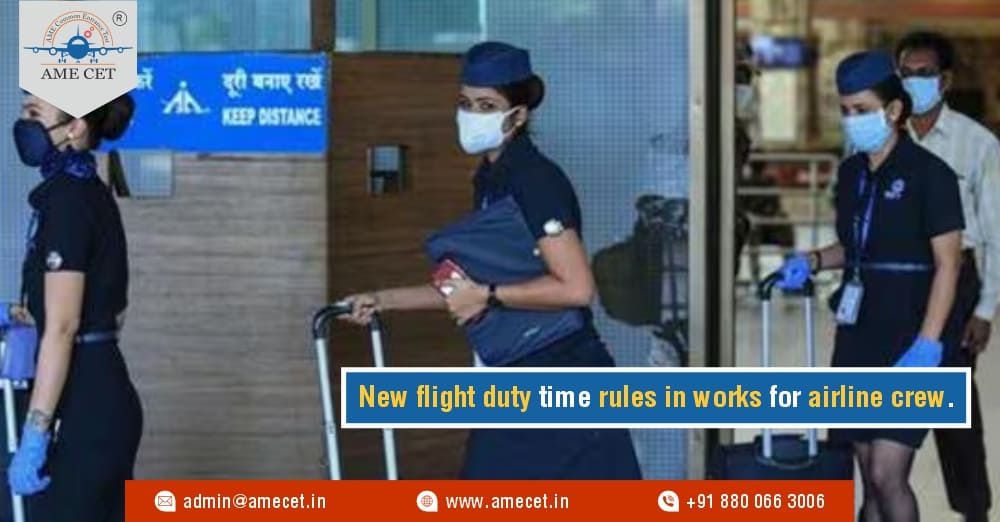
In a proactive effort to enhance safety and well-being in the aviation industry, new flight duty time rules are currently being developed for airline crew members, including cabin crew and ground staff. As air travel demand rises, ensuring that airline personnel are adequately rested and alert has become paramount. This initiative has garnered significant attention from major airlines in India, such as Air India, Vistara, and IndiGo, as well as industry bodies like the Aircraft Maintenance Engineers Association (AMECET).
The Importance of Flight Duty Time Regulations
Flight duty time regulations govern the maximum hours that airline crew can operate, encompassing flight time, ground duties, and mandatory rest periods. These regulations are critical for mitigating fatigue, which has been shown to impair performance and decision-making. Fatigue among cabin crew and ground staff can have far-reaching consequences for passenger safety and overall flight operations.
As incidents of fatigue-related issues have come under increased scrutiny, stakeholders within the aviation sector have recognized the need for comprehensive reforms. The proposed new rules aim to address these concerns, creating a framework that better protects airline personnel while ensuring operational efficiency.
Recent Developments and Stakeholder Involvement
With ongoing discussions among various stakeholders, including airlines, unions, and regulatory bodies, there is a consensus that new flight duty time rules are essential. Major airlines like Air India and Vistara have expressed their commitment to prioritizing crew welfare in light of these discussions. Ground staff and cabin crew have long advocated for improved working conditions, and these proposed regulations may finally provide the safeguards they seek.
In particular, the involvement of AMECET highlights the importance of maintenance crews in the overall safety equation. Ensuring that ground staff, including those responsible for aircraft maintenance, have adequate rest is crucial. Fatigue among maintenance personnel can lead to oversights, which can compromise flight safety.
Proposed Key Features of the New Regulations
While the final details of the new flight duty time rules are still being finalized, several key features have emerged from ongoing discussions:
-
Mandatory Rest Periods: One of the most anticipated changes is the introduction of extended mandatory rest periods for both cabin crew and ground staff. By increasing the time off between shifts, airlines can help reduce fatigue and enhance performance.
-
Limits on Consecutive Duty Days: To further mitigate fatigue, the new regulations may include restrictions on the number of consecutive duty days. This would allow crew members to recuperate and return to work refreshed.
-
Monitoring Fatigue Levels: Implementing systems to monitor fatigue levels among crew members could also be a significant aspect of the new regulations. This could involve technology that tracks working hours and sleep patterns, providing management with insights into crew well-being.
-
Special Provisions for Ground Staff: Acknowledging the critical role of ground staff, the new rules may include specific provisions to address their unique challenges. Ensuring that ground personnel have adequate rest before critical tasks—like aircraft maintenance or preparing for boarding—can enhance safety and operational efficiency.
Industry Reactions
The response to the proposed flight duty time rules has been overwhelmingly positive among airline crew members and their unions. The Indian Pilots’ Guild and the Cabin Crew Association have been vocal in their support, emphasizing the need for regulations that prioritize health and safety.
Airlines like Air India and IndiGo have also welcomed the discussions, recognizing that improved regulations can lead to higher safety standards and better operational performance. However, some concerns remain regarding the potential impact on airline scheduling and costs. Balancing the needs for safety, efficiency, and profitability will be a significant challenge as these rules are finalized.
Impact on Passenger Safety and Experience
For passengers, the implications of new flight duty time rules are significant. Enhanced regulations for cabin crew and ground staff contribute directly to a safer flying experience. When crew members are well-rested and alert, they are better equipped to manage in-flight operations, respond to emergencies, and provide high-quality customer service.
Moreover, a focus on crew welfare can lead to improved morale and job satisfaction among airline staff. Happier employees often translate to better service for passengers, creating a more pleasant travel experience.
Future Prospects
The proposed flight duty time rules reflect a growing recognition of the importance of crew well-being in the aviation sector. As discussions continue, the involvement of key players like Air India, Vistara, IndiGo, and AMECET will be crucial in shaping the final regulations.
Industry experts believe that if implemented effectively, these new rules could set a precedent not only for India but also for global aviation standards. The commitment to ensuring that airline crew and ground staff are not only compliant with regulations but also genuinely supported in their roles marks a positive shift in the industry’s approach to safety.
Conclusion
The development of new flight duty time rules represents a vital step forward for the aviation industry. By prioritizing the health and safety of airline crew members—cabin crew, ground staff, and maintenance personnel—these regulations promise to enhance overall flight safety and improve the flying experience for passengers.
As the aviation sector continues to evolve, the commitment to implementing comprehensive and effective flight duty time rules reflects a forward-thinking approach to safety and operational excellence. With the participation of key airlines and industry bodies, the future of aviation looks increasingly brighter, emphasizing a balance between crew welfare and passenger safety that is essential for sustainable growth.
Category
-
Aircraft Maintenance Engineering (DGCA) (62)
-
(268)
-
Cabin Crew (1)
-
Aerospace Engineering (3)
-
Aeronautical Engineering (2)
-
Airport Management (5)
-
Aircraft Maintenance Engineering (EASA) (6)
-
Airport Ground Staff (1)
-
Commercial Pilot License(CPL) (51)
-
Aircraft Maintenance Engineering (BTech/BE) (1)
-
B.Sc. in Aviation (1)
-
AME CET (5)
